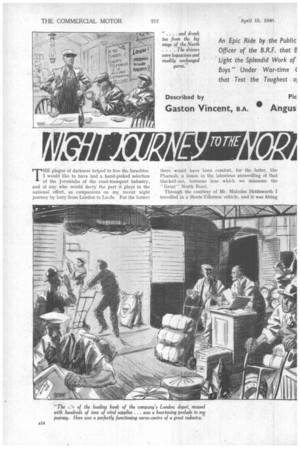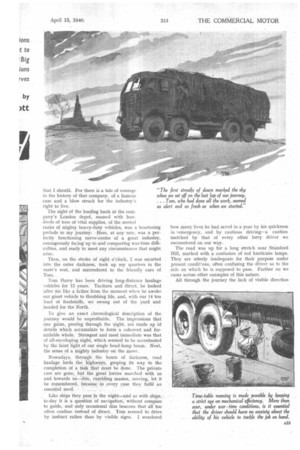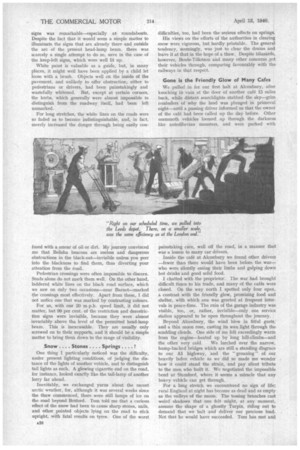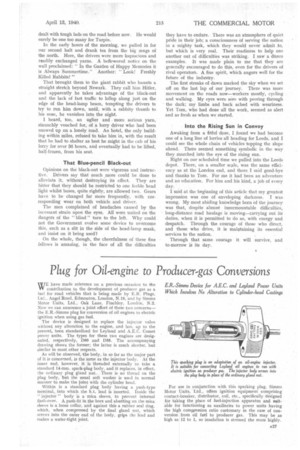PH I INNS
Page 26

Page 27

Page 28

Page 29

If you've noticed an error in this article please click here to report it so we can fix it.
MTHEAra
An Epic Ride by the Public Officer of the B.R.F. that E Light the Splendid Work of Boys" Under War-time ( that Test the Toughest oi Described by Pic
Gaston Vincent, B.A. Angus
by At
THE plague of darkness helped to free the Israelites. I would like to have had a hand-picked selection of the jeremiahs of the road-transport industry, and of any who would decry the part it plays in the national effort, as companions on my, recent night journey by lorry from London to Leeds. For the -former
there would have been comfort, for the latter, like Pharaoh, a lesson in the laborious unravelling of that blacked-out, tortuous lane which we misname the "Great " North Road.
Through the courtesy of Mr. Malcolm Holdsworth 1 travelled in a Bouts-Tillotson vehicle, and it was fitting
that I should. For there is a tale of courage in the history of that company, of a famous case and a blow struck for the industry's right to live.
The sight of the loading bank at the company's London depot, massed with hundreds of tons of vital supplies, of the serried ranks of mighty heavy-duty vehicles, was a heartening prelude to my journey. Here, at any rate, was a perfectly functioning nerve-centre of a great industry, courageously facing up to and conquering war-time difficulties, and ready to meet any circumstances that might arise.
Then, on the stroke of eight o'clock, I was escorted into the outer darkness, took up my quarters in the mate's seat, and surrendered to the friendly care of Tom..
Tom Harry has been driving long-distance haulage vehicles for• 15 years. Taciturn and direct, he looked 'after me like a father from the moment when he awoke our giant vehicle to throbbing life, and, with our 14 ton load of foodstuffs, we swung out of the yard and .headed for the North.
To give an exact chronological description of the• journey would be unprofitable. The impressions that one ,gains, peering through the night, are made up bf details which accumulate to form a coherent and formidable whole. Strongest and most immediate was that of all-enveloping night, which seemed to be accentuated by the faint light of our single head-lamp beam. Next, the sense of a mighty industry on the move, Nowadays, . through. the hours of darkness, road haulage lords the highways, groping its way to the completion of a task' that must be done. The private cars are gone, but .--the .great lorries. marched with us and towards us—dim, rumbling masses, moving, let it . be remembered; because. in every case they fulfil an
. essential need. : . . . •
Like ,ships they, pass in the night—and as with ships, to-day it is a question of navigation 'without compass to guide, and only occasional dim beacons that all too often confuse instead of direct. Tom seemed to drive by instinct rather than by visible signs. I wondered
how many lives he had saved in a year by his quickness in •emergency, and by cautious driving—a caution matched by that of every other lorry driver we encountered on our way.
The road was up for a long stretch near Stamford Hill, marked with a confusion of red hurricane lamps. They are utterly inadequate for their purpose under present condit'ons, often confusing the driver as to the ,side on which he is supposed to pass. Farther on we came across other examples of this nature.
All through the journey the lack of visible direction
signs was remarkable—especially at roundabouts. Despite the fact that it would seem a simple matter to illuminate the signs that are already there and outside the arc of the present head-lamp beam, there was scarcely a single attempt to do so, save in the case of the keep-left signs, which were well lit up.
White paint is valuable as a guide, but, in many places, it might well have been applied by a child let loose with a brush. Objects well on the inside of the pavement, and unlikely to offer obstruction; either to pedestrians or drivers, had been painstakingly and wastefully whitened. But, except at certain corners, the kerbs, which generally were almost impossible to distinguish from the roadway itself, had been left unmarked.
For long stretches, the white fines on the roads were so faded as to become indistinguishable, and, in fact, merely increased the danger through being easily con
fused with a smear of oil or dirt. My journey convinced me that Belisha beacons are useless and dangerous obstructions in the black-out—invisible unless you peer into the blackness to find them, thus diverting your attention from the road.
Pedestrian crossings were often impossible to discern. Studs alone do not mark them well. On the other hand, laddered white lines on the black road surface, which we saw on dnly two occasions—near Barnet—marked the crossings most effectively. Apart from these, I did not notice one that was marked by contrasting colours.
For us, with our 20 m.p.h. speed limit, it did not matter, but 99 per cent of the restriction and derestriction signs were invisible, because they were almost invariably above -the level of the permitted head-lamp beam. This is inexcusable. They are usually only screwed on to their supports, and it should be a simple matter to bring them down to the range of visibility.
Snow. .... Stones .... Springs One thing I particularly noticed was the difficulty, under present lighting conditions, of judging the distance of the lights of another vehicle, and to distinguish tail lights as such. A glowing cigarette end on the road, for instance, looked exactly like the tail-lamp of another lorry far ahead.
Inevitably, we exchanged yarns about the recent arctic weather, for, although it was several weeks since the thaw commenced, there were still lumps of ice on the road beyond Retford, Tom told me that a curious effect of the snow had been to cause sharp stones, nails, and other pointed objects lying on the road to stick upright, with fatal results on tyres. One of the worst difficulties, too, had been the serious effects on springs.
His views on the efforts of the authorities in clearing snow were vigorous, but hardly printable. The general tendency, seemingly, was just to clear the drains and leave it at that in the hope of a thaw. Despite blizzards, however, Bouts-Tillotson and many other concerns got their vehicles through, comparing favourably with the railways in that respect.
Gone is the Friendly Glow of Many Cafes We pulled in for our first halt at Alconbury, after knocking in vain at the door of another café 15 miles back, while distant searchlights stabbed the sky—grim reminders of 'why the land was plunged in primeval night—until a passing driver informed us that the owner of the cafe had been called up the day before. Other mammoth vehicles loomed up through the darkness like antediluvian monsters, and were parked with
painstaking care, well off the road, in a manner that was a lesson to many car drivers.
Inside the café at Alconbury we found other drivers —fewer than there would have been before the war— who were silently easing their limbs and gulping down hot drinks and good solid food.
I chatted with the proprietor. The war had brought difficult times to his trade, and many of the cafés were closed. On the way north I spotted only four open, a contrast with the friendly glow, promising food and shelter, with which one was greeted at frequent intervals in peace-time. The ruin of the garage industry was visible, too, or, rather, invisible—only one service station appeared to be open throughout the journey.
Beyond Alconbury, the wind blew in fitful gusts,' and a thin moon rose, casting its wan light through the scudding clouds. One side of the felt exceedingly warm
from the engine—heated up by long hill-clirnbe and the other very cold. We lurched over the narrow, hump-backed bridges which are still a standing disgrace to our Al highway, and the " groaning " of our heavily laden vehicle as we did so made me wonder how it could stand the strain, and pay silent tribute to the men who built it. We negotiated the impossible bend at Stamford, where it seems a miracle that any heavy vehicle can get through.
For a long stretch we encountered no sign of life; rural England at night has become as dead and as empty as the valleys of the moon. The tossing branches cast weird shadows that one felt might, at any moment, assume the shape of a ghostly Turpin, riding out to demand that we halt • and deliver our precious load. Not that he would have succeeded. Tom has met and
dealt with tough lads on the road before now. He would surely be one too many for Turpin.
In the early hours of the morning, we pulled in for our second halt and drank tea from the big mugs of the north. Here, the drivers were more loquacious and readily exchanged yarns. A beflowered notice on the wall proclaimed: " In the Garden of Happy Memories it is Always Summertime." Another: " Look! Freshly Killed Rabbits!"
That brought them to the giant rabbit who haunts a straight stretch beyond Newark. They call him Hitler, and apparently he takes advantage of the black-out and the lack of fast traffic to lollop along just on the edge of the head-lamp beam, tempting the drivers to try to run him down, until, with a rabbity thumb to his nose, he vanishes into the night.
I heard, too, an uglier and more serious yarn, staunchly vouched for, of a lorry driver who had been snowed up on a lonely road. An hotel, the only building within miles, refused to take him in, with the result that he had to shelter as best he might in the cab of his lorry for over 36 hours, and eventually had to be lifted, half-frozen, from his seat.
That Blue-pencil Black-out Opinions on the black-out were vigorous and instructive. Drivers say that much more could be done to alleviate it, without destroying its effect. They are bitter that they should be restricted to one feeble head light whilst buses, quite rightly, are allowed two. Gears have to be changed far more frequently, with corresponding wear on both vehicle and driver.
The men complained of headaches caused by the incessant strain upon the eyes. All were united on the dangers of the " blind" turn to the left. Why could not the Government evolve some device to overcome this, such as a slit in the side of the head-lamp mask, and insist on it being used?
On the whole, though, the cheerfulness of these fine fellows is amazing, in the face of all the difficulties they have to endure. There was an atmosphere of quiet pride in their job; a consciousness of serving the nation in a mighty task, which they would never admit ,to, but which is very real. Their readiness to help one another out of difficulties was striking. I saw a citizen examples. It was made plain to me that they are generally encouraged to do this, even for the drivers of rival operators. A fine spirit, which augurs well for the future of the industry.
The first streaks of dawn marked the sky when we set off on the last lap of our journey. There was more movement on the roads now—workers mostly, cycling and walking. My eyes were sore with peering through the dark; my limbs and back ached with weariness. Yet Tom, who had done all the work, seemed as alert and as fresh as when we started.
Into the Rising Sun in Convoy
Awaking from a fitful doze, I found we had become one of a long line of lorries all heading for Leeds, and I could see the whole chain of vehicles topping the slope ahead. There seemed something symbolic in the way they marched into the eye of the rising sun.
Right on our scheduled time we pulled into the Leeds depot. There, on a smaller scale, was the same efficiency as at the London end, and there I said good-bye and thanks to Tom. For me it had been an adventure and an education. For him and his kind, a job of every day.
I said at the beginning of this article that my greatest impression was one of enveloping darkness. I Was wrong. My most abiding knowledge born of the journey was that, despite almost insurmountable difficulties, long-distance road haulage is moving—carrying out its duties, when it is permitted to do so, with energy and despatch. Through the courage of those who direct, and those who drive, it is maintaining its essential services to the nation.
Through that same courage it will survive, and to-morrow IS its day.




















































